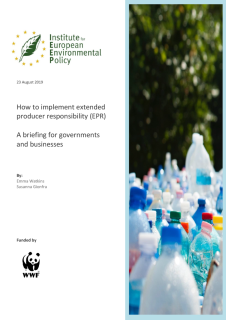
The concept of Extended Producer Responsibility (EPR) aims to ensure that the manufacturers of products are made responsible for various parts of the entire life cycle of their product, including take-back, recycling, and final disposal at the end of a product’s useful life. EPR has generally been recognised as a critical policy tool to combat plastic pollution. By holding manufacturers accountable for their plastic products’ and packaging’s end-of-life impacts, it helps increase collection and recycling rates as well as encourage the reduction of plastic packaging at the design stage. EPR schemes also have benefits for governments and businesses—they provide governments with the tools to solve environmental issues while promoting economic development and they enable businesses to gain a head start in the transition towards the circular economy, thus mitigating reputational and regulatory risks.
This report is designed as guidance to WWF network offices on engaging businesses and governments to promote the introduction of EPR schemes and legislation. It indicates that EPR schemes can be utilised as a tool for establishing functioning waste management systems and explains the feasible next steps towards these schemes.
